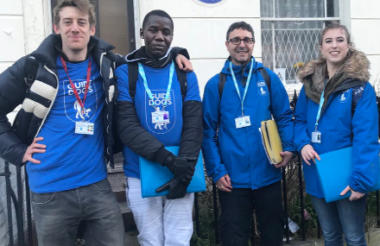The Insitute of Fundraising's Alex Xavier took part in some door-to-door fundraising, and asks whether, with the rise of GDPR, the time is right for organisations to re-engage with the method.
As I near the end of my first month working at the Institute, I have been struck by the enormous amount of effort being put in on a daily basis by public fundraisers. This month has been challenging for the sector as we navigate ourselves through immense media scrutiny. During this, we should not forget the incredible impact charities and agencies have in raising money for good causes – and the vital role public fundraisers have in putting a face to a cause.
I wanted to witness this great work first hand. Whilst shadowing a fundraising team, it became clear to me that a vast array of skills are required to be an effective door-to-door fundraiser, and I wanted to go through the things that jumped out at me as essential.
Leadership at all levels
On a cold and windy afternoon in South London, I met the group on the corner of a side road. The great cause being represented – Guide Dogs – was clearly displayed on their bright blue jackets, with the objective being to sign up donors to a monthly commitment to sponsor a puppy – Poppy or Alfie.
The team leader delivered a motivational briefing which was absorbed with enthusiasm, and highlighted the importance of situational leadership, the practice of adjusting your style to suit the person you’re talking to. This struck me as particularly important as the group were made up of a mix of new and experienced fundraisers. However, despite the varying levels of experience, it was everyone’s role to lead and motivate the team.
Empathy is key
Making the ask in the right way is central to providing an exceptional donor experience. As the team worked their way down the street, they handled questions in the right way – using empathy. They were not pushy, but very understanding of the common questions put to them. As soon as they reached three asks within a two-way discussion, they would politely thank the prospective donor and move on to the next door.
Door-to-door fundraising has received negative press in the past, with claims of aggressive and pushy ‘sales’ tactics. But my experience shows that door-to-door, when done in the right way, can make a profound difference to one individual’s relationship with a charity. As a professional body, we know that the vast majority of public fundraisers operate in an ethical way however, as with any profession, we know a small minority can tarnish the reputation of the majority.
Interpersonal skills to last a lifetime
Some of the individuals in the team may go on to build long-term careers in fundraising, whilst others may move on to other areas of work. What became very clear to me is that the experience of working in public fundraising can help develop exceptional interpersonal skills – particularly amongst younger fundraisers.
A recent Forbes article touched on how millennials are struggling with face to face communication skills however, whilst observing a young fundraiser engage in a meaningful conversation with a prospective donor, it seems millennials in fundraising are doing just fine. She showcased good eye contact and body language, which instantly put the prospective donor at ease. Whether she stays in fundraising or moves on to other things, she will have honed her communication skills through countless face to face conversations, which may give her the edge as she progresses in her career.
Being able to recognise vulnerability
One aspect of the experience I was less prepared for was the vulnerable people the team came across. These included elderly people with possible medical conditions, as well as those who couldn’t speak English.
The Institute of Fundraising provides specific guidance on how to handle these situations, but it was very apparent that door-to-door fundraisers have to use their own judgement and intuition to ensure a positive disengagement with the individuals concerned. This showcased the need to not only be trained on the signs of vulnerability, but also how to handle an array of situations. The team were skilled in these areas, and ensured no risks were taken.
The importance of resilience
With the onset of GDPR, organisations may want to re-engage with face to face fundraising as a viable method of sourcing sustainable charitable income. My experience watching door-to-door fundraisers at work showcased the depth and breadth of their skill sets, and the importance of high quality induction training and continuous professional development.
However, regardless of how prepared you may be, you are sure to have doors slammed in your face and interact with less than polite prospective donors. The sector are fostering a generation of resilient and professional fundraisers, just like the ones I met on a cold afternoon in South London. I look forward to working with them whilst embedding compliance and professional standards within the culture of the UK fundraising community. These fundraisers are key to making that happen.
Alex Xavier is director of membership, compliance and professional development at the Institute of Fundraising.
Civil Society Media would like to thank the Institute of Fundraising for their support with this article.
Related Articles












